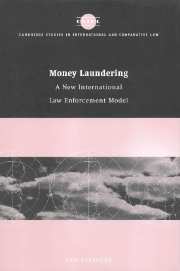Book contents
- Frontmatter
- Contents
- Preface
- Table of treaties and agreements
- List of abbreviations
- Part I New instruments in the fight against acquisitive crime: confiscation of proceeds from crime and criminalisation of money laundering
- Part II The prevention of money laundering
- Part III Jurisdiction over money laundering
- Part IV International co-operation in combating money laundering
- 11 The money laundering regime: new objectives of international co-operation in criminal matters
- 12 The money laundering regime: new modes of international evidence-gathering
- 13 Some of the conditions, principles and exceptions of mutual judicial assistance in criminal matters revisited
- 14 Lifting banking secrecy in an international context
- 15 Provisional measures for preserving alleged proceeds of crime in an international context
- 16 International enforcement of confiscation orders
- Epilogue
- Bibliography
- Index
- CAMBRIDGE STUDIES IN INTERNATIONAL AND COMPARATIVE LAW
16 - International enforcement of confiscation orders
Published online by Cambridge University Press: 16 October 2009
- Frontmatter
- Contents
- Preface
- Table of treaties and agreements
- List of abbreviations
- Part I New instruments in the fight against acquisitive crime: confiscation of proceeds from crime and criminalisation of money laundering
- Part II The prevention of money laundering
- Part III Jurisdiction over money laundering
- Part IV International co-operation in combating money laundering
- 11 The money laundering regime: new objectives of international co-operation in criminal matters
- 12 The money laundering regime: new modes of international evidence-gathering
- 13 Some of the conditions, principles and exceptions of mutual judicial assistance in criminal matters revisited
- 14 Lifting banking secrecy in an international context
- 15 Provisional measures for preserving alleged proceeds of crime in an international context
- 16 International enforcement of confiscation orders
- Epilogue
- Bibliography
- Index
- CAMBRIDGE STUDIES IN INTERNATIONAL AND COMPARATIVE LAW
Summary
The enforcement of confiscation orders in an international context can give rise to legal problems as the state that wants to enforce a confiscation order may lack enforcement jurisdiction because the property on which it wants to enforce the confiscation order is situated abroad. This problem is most likely to arise with object confiscation, when the property specified in the confiscation order is located abroad, but can also present itself in case of value confiscation, when the convicted person refuses to pay his confiscation order and has no or not enough property on the territory of the state concerned.
Two scenarios can be posited to deal with this lack of enforcement jurisdiction. First, the state wishing to enforce its confiscation order on property located abroad can issue unilateral measures to this end. Second, the state which lacks enforcement jurisdiction can request co-operation from a state that has enforcement jurisdiction, that is, a state on whose territory property is located on which the confiscation order may be enforced. This co-operation will mostly take place on the basis of the co-operation mechanisms such as those provided for by the Vienna Convention and the Money Laundering Convention. Co-operation should not be excluded in the absence of a treaty basis, however, a proposition which has been set out more in detail elsewhere in this book. It is proposed first to analyse the unilateral measures to enforce confiscation orders. The co-operation mechanisms for enforcing confiscation orders will then be studied, as will the practice of international asset sharing.
Unilateral confiscation measures
The nub of the question that arises here is whether a state has jurisdiction to confiscate property located outside its territory.
- Type
- Chapter
- Information
- Money LaunderingA New International Law Enforcement Model, pp. 381 - 419Publisher: Cambridge University PressPrint publication year: 2000



